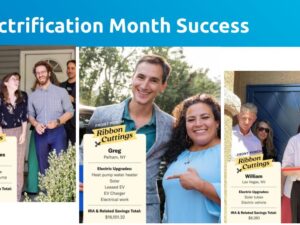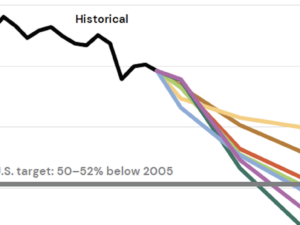By Tony Sirna
While CCL remains focused on enacting federal Carbon Fee and Dividend legislation, we are supporting carbon pricing efforts at the state level to increase pressure on the federal government to act on climate.
State-level efforts are already underway across the country including in a number of states you might find surprising. Massachusetts-based ClimateXChange is managing the State Carbon Pricing Network which provides resources to carbon pricing groups and catalogs information on the various efforts underway.
Bills have already been submitted in Massachusetts, Rhode Island, Washington, New York, Oregon, California, and Utah, with groups also working in a number of other states.
Policies vary from state to state as the political, economic, and legal environment vary. Some states have restrictions on how fees can be collected or how taxes must be allocated (fuel taxes must go to highway funds, for example). Since states can’t easily do border adjustments, they must use other systems if they want to provide a level playing field for businesses in other states and prevent ‘emissions leakage’ when businesses shift production to other states where there is not a carbon tax.
Most states are focused on a carbon tax with the exception of Oregon, which is considering a cap and trade program (California also already has a cap and trade program since 2013 but the program requires an extension to go beyond 2020). Some of the bills are revenue-neutral, often including some form of dividend, while others include at least some reinvestment of revenue, generally into climate related programs.
How is CCL engaging?
CCL supports carbon pricing efforts that meet four criteria:
- They are designed to be effective at reducing GHG emissions beyond existing policies.
- They will protect low income households from price increases.
- They are politically viable for the state
- They will harmonize with a federal Carbon Fee and Dividend and other state carbon pricing.
CCL is not in a position to drive state-level effort and instead is supporting other organizations who are engaged on such efforts. CCL staff is working to support efforts across the country but our capacity is limited, with just ¼ of 1 staff member’s time devoted to state-level efforts. Currently our support is limited to providing guidance on how to connect with existing groups or how to start a carbon pricing organization in your state.
In most cases, CCL volunteers are already deeply engaged with these efforts, often playing key roles these organizations. CCLers are encouraged to reach out to their local state organizations for information on how to get involved.
CCL volunteers can bring some key experience to these efforts, since most of what we know about building political will and building relationships can apply at the state-level as well. We know how to work with the media. We know how to lobby elected officials and build relationships with them and their staff. We know how to build and demonstrate grassroots support on climate. We are learning how to engage community leaders and business leaders to seek endorsements and build their support for climate action. All of this can apply at every level of our government.
In some states, significant work has already been done in building coalitions with potential allies, in crafting policy, and in building relationships with legislators and other stakeholders. In others, this work is just beginning. You will find, though, that the political climate of each state is different and the key stakeholders are different. For instance, in a state that leans Democratic you might not find the same insistence on revenue neutrality that you might find in a more Republican state. In states without a big extractive economy you may find different dynamics from one where a lot of fossil fuels are produced. It can be important not to come in to state level work with too many assumptions and to start by taking time to understand the political landscape.
CCL’s goal is to provide support to these efforts as we are able, and to be a catalyst for effective carbon pricing efforts. In turn we hope those efforts will provide us an additional point of leverage as we push towards our goal of a federal Carbon Fee and a healthy climate.






